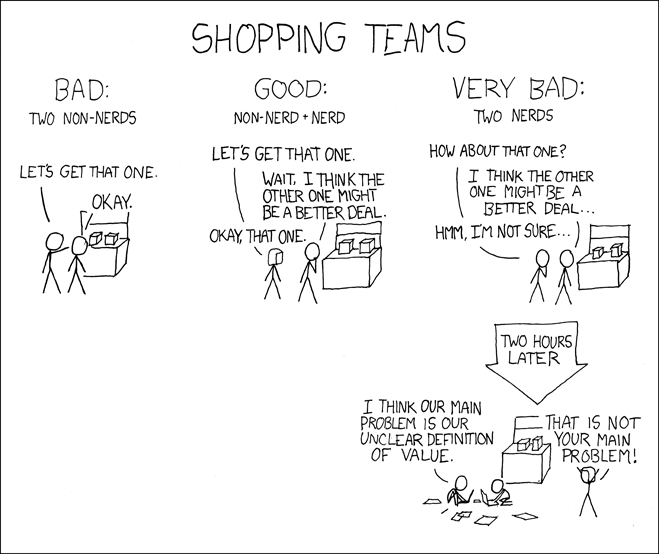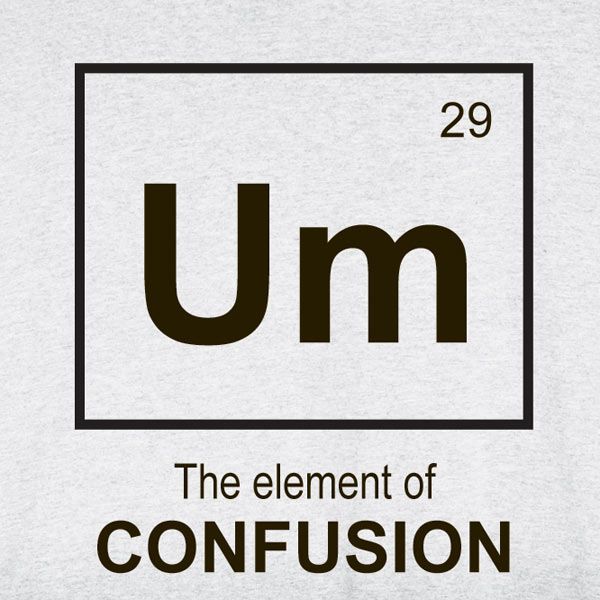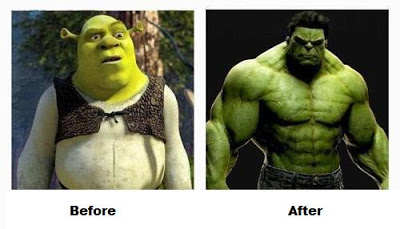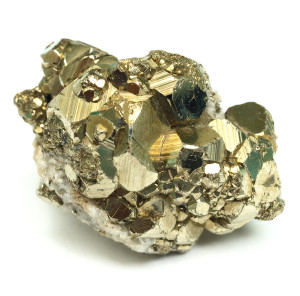Systematic Reviews: All that glitters is not gold.
This is a short article I submitted to Science-Based Medicine a couple of years ago, which never made it to their blog and then I forgot about it. But then I came across it and figured I should use it since I already did the work; and lately there seem to be a lot of systematic reviews being published. Read More...
Do I or don’t I….go to medical school?

Because finding an image for this post was too much work after I wrote this. Credit: XKCD.com (my one true love)
I’m going to make an even further departure from my regular theme of posts as I’ve been getting a few emails from readers who are looking for career advice; and my answers have had some consistent themes, so why not exploit that and make a blog post out of it, right? Read More...
How to decide when you don’t know how to decide

I don’t know why they picked 29, since that the atomic number for copper, but this design is from http://www.whatonearthcatalog.com/cgi-bin/hazel.cgi?action=DETAIL&ITEM=CL9321
Two things happened this week that inspried me to write this post: Read More...
MOAR PROTEIN??
 I saw this abstract in my Facebook feed, and when I saw, “randomized controlled trial” in the title, I knew I had to read it because good randomized controlled trials in fitness and nutrition are hard to come by. Let’s say that I was pleasantly surprised and excited by this one; and truthfully, that doesn’t happen that often.
I saw this abstract in my Facebook feed, and when I saw, “randomized controlled trial” in the title, I knew I had to read it because good randomized controlled trials in fitness and nutrition are hard to come by. Let’s say that I was pleasantly surprised and excited by this one; and truthfully, that doesn’t happen that often.
Before we talk about the study, I think it’s important to differentiate between “high-protein” diets and “low-something else” diets. “High protein” means that the first maconutrient of importance is protein and when figuring how much carb and fat to eat, the calories not taken up by protein are then taken up by the other two macronutrients. “Low something-else” means that the first macronutrient taken into consideration is the “something else” (these days it’s usually carbohydrate), and then the rest is available for fat and protein. This doesn’t mean that a low-carb diet is automatically a “high protein” one, or, more importantly, that a “high protein” diet is automatically a low-carb one. Read More...
Pride
 This weekend marks the anniversary of the Stonewall Riots in New York City in 1969, when gay men and women in the Stonewall Inn on Christopher Street rioted against the police who made regular raids on the bar. This sparked a multi-day marching demonstration against the oppression of gay people in America and is the reason why the Pride Parade takes place every year, despite the gross commercialization of the event today.
This weekend marks the anniversary of the Stonewall Riots in New York City in 1969, when gay men and women in the Stonewall Inn on Christopher Street rioted against the police who made regular raids on the bar. This sparked a multi-day marching demonstration against the oppression of gay people in America and is the reason why the Pride Parade takes place every year, despite the gross commercialization of the event today.
Me, I’m a “late gay”. I didn’t come out until my late twenties. But more to the point, I don’t derive a lot of fun from going to mainstream clubs–gay or straight. When I looked at the schedule for Pride weekend in NYC, I had the options of a club, another club, a rooftop club, a pool party club, a club party on Governor’s island, a club part on the Chelsea piers, the Parade and more clubs. The word “club” has now stopped looking like the word “club”. So, despite wanting to celebrate what I consider to be an important anniversary of the civil movement of MY time, I really didn’t think I had a lot of options. This got me to thinking about what Pride means to me. Read More...
The State of Evidence-Based Fitness
I wanted to start my new site with a new post, but as with everything on this site, I get most of my blogging ideas from other people. I got the idea to write this entry from The Oatmeal’s “State of the Web”. Unfortunately, I have the drawing ability of Matthew Inman’s dog (this is debateable as I’m just surmising that his dog can’t draw very well). So you just get text with no nifty comic. 🙁 Read More...
30 seconds of idiocy. The cure for cancer is delayed by decades.

There was a really interesting letter in the journal Nature on Thursday, “Australia’s grant system wastes time,” which was about how much time goes into preparing a grant for funding with Australia’s National Health and Medical Research Council (in Canada, this would be the Canadian Institutes for Health Research, and in the US, the National Institutes of Health). The authors of the letter did a survey of Australian researchers and found that it took, on average, 38 working days to prepare a new proposal. They extrapolated their survey data to estimate how much cumulative time was spent by Australian researchers who applied to the NHMRC preparing grants, and estimated thatn 550 working years of research time was spent on this endeavour. As with all federal funding agencies, only a small percentage of grant proposals get funding. In 2012, that was 20.5% in Australia. So, basically, about four centuries of cumulative research time was wasted, with no return on the time spent. The point of the letter was to encourage the NHMRC to simplify the application process to decrease the time wasted.
But there’s another insidious drain on research that goes unrecognized and I think really has manifested itself only in the past 10-ish years with the explosion of self-help publishing as well as the widespread adoption of social media that permits easy viral sharing of ideas; and that is the constant distraction of sensationalism. Read More...
How statistics can protect your willpower

Today is Valentine’s Day (Happy Valentine’s/Bitter Single’s Day!). So I thought I’d give my post a brain-washing theme (cynical much? 🙂 )
With the advent of Instagram, Facebook, Twitter and now, Vine, the power of the testimonial has never been greater. It’s easy to be bombarded by images of amazing before and after, and even “now” photos of clients of trainers and nutritionists, all trying to cajole their way into your mind and ultimately into your wallet. Googling the terms “fitness”, “marketing” and “testimonial” returns over 100,000 hits, the first few pages of which are testimonials on how testimonials can help grow a fitness business. How’s that for meta? Read More...
You are going to die.

So there’s been ANOTHER study on some food and mortality. Last time, it was red meat. This time, it’s eggs. To be honest, I’m not even going to read it. (Ok, I lied. I read it. Who are we kidding?) It’s not the first study on eggs. It won’t be the last. And it definitely won’t be the last study of its kind in terms of trying to link what is really a very small part of life to mortality.
Being in medicine (yes, even in plastic surgery) has taught me a lot of thing, but one sure-fire experience is death, and dying. Most people in our society get very limited exposure to death, and fewer to dying. Most of us will only experience death when family members or friends die, which hopefully isn’t that frequent. Very few people have experienced dying–not many people sit with the dying anymore (in my experience). Some of us will personally face death prematurely, but recover, which may or may not change our view on life. Read More...
You don’t add higher octane gas to the house that’s on fire to put it out.

The World Health Organization’s definition of health, which I had to memorize in the first month of medical school, is, “The state of complete physical, mental and social well-being and not merely the absence of disease or infirmity.”
Personally, I think this is ridiculous because it’s basically tautological. The term “well-being” is essentially synonymous with “health”. In fact, the Merriam-Webster dictionary defines “well-being” as, “The state of being happy, healthy or prosperous.” Way to go, 1948 WHO’er’s. It’s like looking in the dictionary for the definition of “happy” and seeing “not sad” and then looking up “sad” and seeing its definition as “not happy.” (Flashbacks to being the child of immigrant parents inserted here. And yes, I was a weird kid and yes, my parents will tell you that.) Read More...

